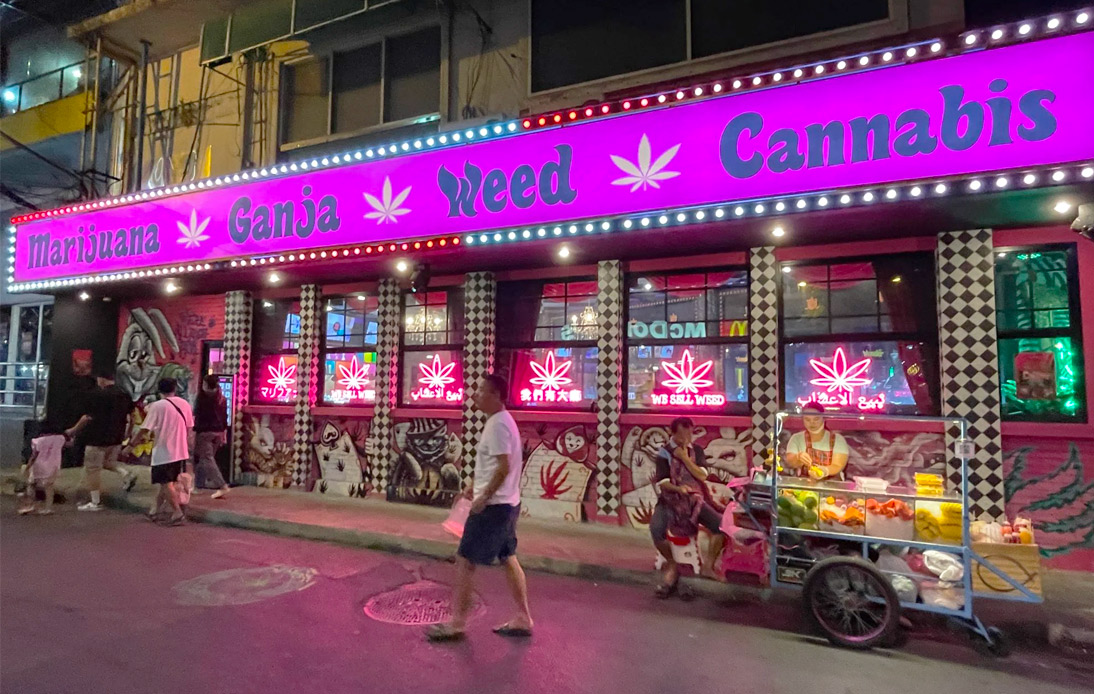
Over a year since Thailand approved the recreational consumption of marijuana, the nation’s recent prime minister intends to revise this legislation, aiming to address the existing market saturation and ensure sustained growth for the industry.
In June 2022, Thailand pioneered the decriminalization of cannabis in Asia, permitting its unrestricted cultivation and use.
Following this change, the marijuana market saw a surge of enterprises joining the fray, often with scant oversight or directives for consumer protection, leading to a virtually unregulated environment.
Now, numerous dispensaries dot Thai urban landscapes, with a significant proportion purveying products that exceed the permissible THC concentration of 0.2%.
Urban areas in Thailand now host numerous dispensaries, a significant number of which offer recreational products exceeding the legal threshold of 0.2% tetrahydrocannabinol (THC) content.
This laissez-faire approach has provoked considerable public rage, with citizens advocating for more stringent laws.
Prime Minister Srettha Thavisin, having assumed office just a month prior, disclosed to Bloomberg his intention to confine marijuana usage solely for therapeutic applications.
“A legislative overhaul is imperative,” asserted Srettha. “A correction is due to permit its regulation exclusively for medicinal objectives.”
In a separate dialogue with Reuters, he voiced concerns about the extensive drug abuse plaguing the nation, expressly contesting the casual consumption of cannabis.
Embrace of Regulatory Tightening
Industry connoisseurs have expressed approval for more rigorous regulations, believing this could preempt market glut and correct the misperception of cannabis as a mere recreational stimulant, overshadowing its medicinal value.
Cannabis has historically been integral to traditional Thai medicinal concoctions, promoting overall wellness.
“The current state of affairs is one of market saturation with cannabis, often not subjected to stringent laboratory scrutiny,” observed Soratat Pongsangiam, head of Phuket’s Greenhead Clinic.
“This oversupply has resulted in a substantial drop in prices, down by 50-60% since we first began. If stricter regulations are implemented, it could potentially restore credibility and control to the industry,” he elaborated.
“Presently, the market is quite chaotic, with many not adhering to any standardized rules.”
He anticipates an absolute prohibition on vaping paraphernalia and cannabis derivatives like oils and waxes. Additionally, cannabis retailers might soon be obligated to submit regular sales inventories to enable closer scrutiny of the merchandise and clientele.
“I foresee a crackdown on unlicensed pop-up shops that currently evade taxes and bypass necessary quality controls and registration processes,” he added.
“The industry would like to see clear regulations, and they want it restricted for medical purposes,” stated Sornkanok Vimolmangkang, an associate professor specializing in plant sciences at Bangkok’s Chulalongkorn University.
Deputy Prime Minister Anutin Charnvirakul, a pivotal proponent for the initial legalization and a coalition ally of Srettha, has conceded the necessity for enhanced oversight given the rampant unregulated exploitation.
However, he remains opposed to the reclassification of cannabis as a narcotic.
Cultural Dilemma
The prevalent recreational misuse of cannabis has inadvertently discouraged patients from seeking its medicinal benefits.
Many entities masquerade as medicinal cannabis providers, yet their primary pursuit of profit compromises patient welfare, undermining the credibility of bona fide clinics due to this ambiguity.
Dr. Jintana Manorompatrasal, at the helm of Bangkok’s alternative medicine-focused Sawasdee Clinic, emphasized the critical need for reinforcing public trust in cannabis therapies.
“This could foster a more positive perception of the cannabis industry among the public, and for the industry to sustain in the long run,” Jintana stated.
“From a medical provider’s standpoint, stricter measures could also highlight the need for more study and research.”
Nevertheless, she cautioned that prior to any legal amendments, strategies must be devised to buffer the local cannabis cultivators, manufacturers, and retailers from the shock of new statutes.
Cannabis Trade Potential
Before the electoral showdown in May, Anutin mooted the idea of Thailand evolving into a cannabis export powerhouse, targeting markets where it’s legally sanctioned, such as the U.S.
Analysts believe this vision could materialize under Srettha’s impending legislative revisions.
“The prospect of exporting cannabis products to legal foreign markets aligns with Thailand’s medical hub policy propelling both medicinal cannabis and other traditional herbs to the forefront,” Jintana stated.
“The entire industry — from growers, extractors, researchers, and service providers — [holds] immense potential for growth and advancement, given the right market support.”
“Such support could translate into higher quality plants, a wider array of varieties, enhanced product development, and increased innovation.”




















